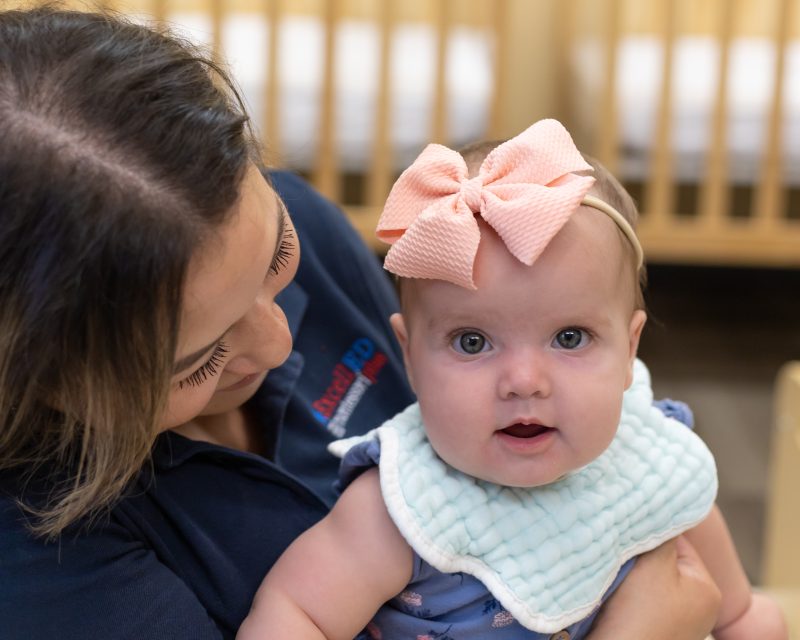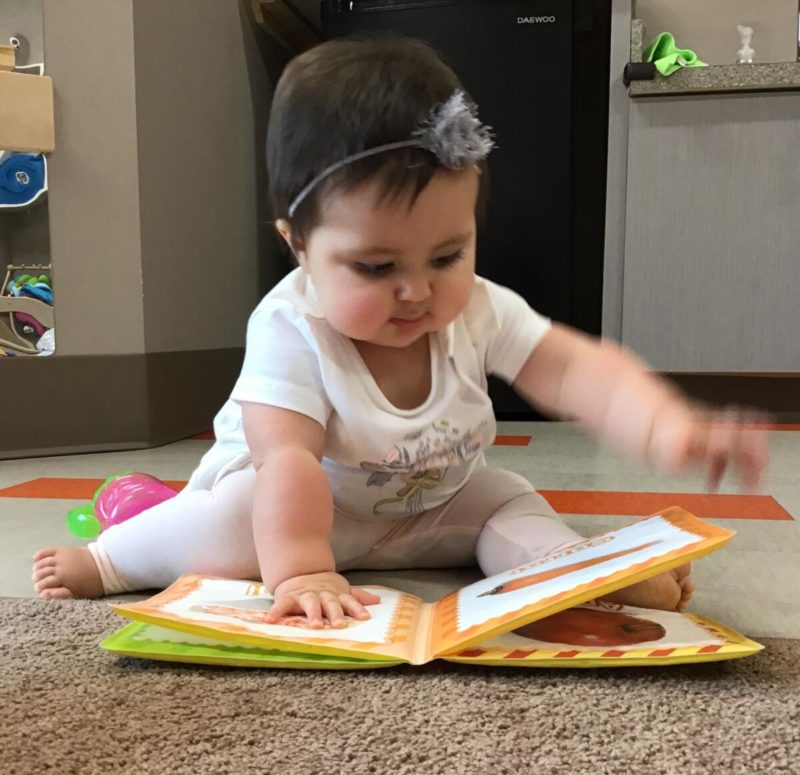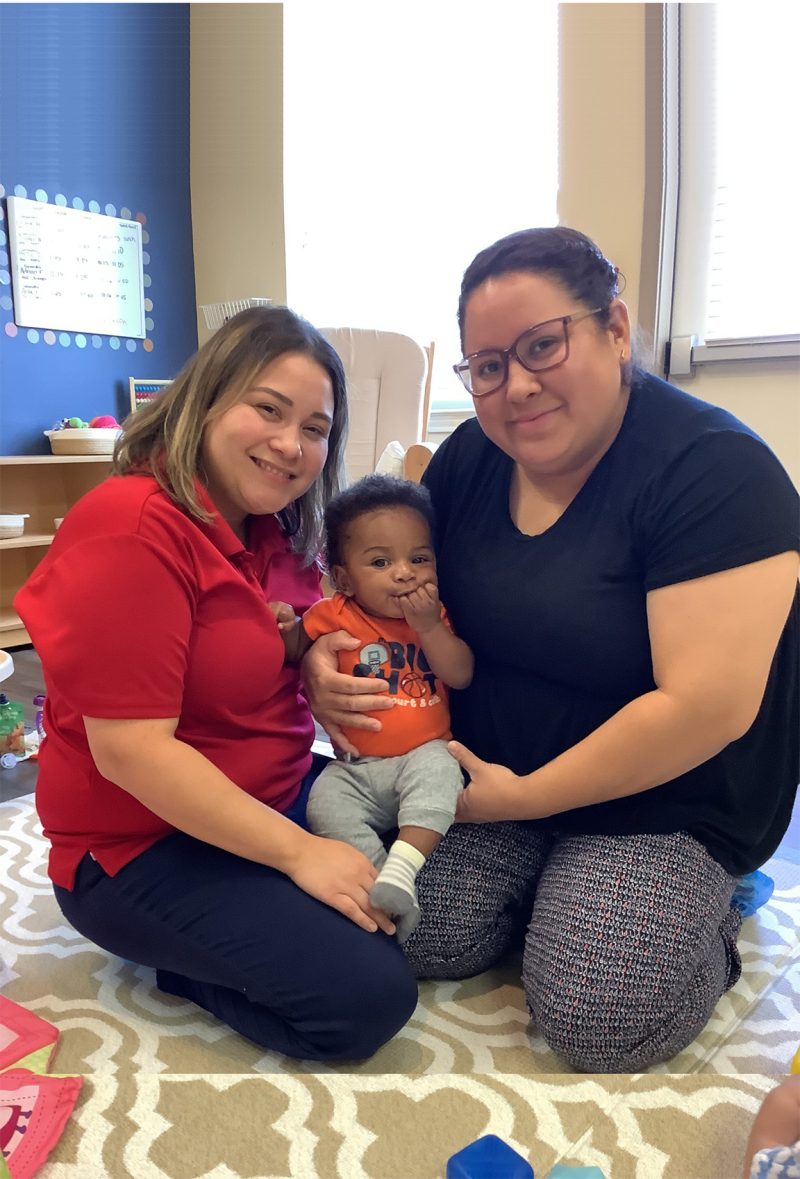The Nido classroom is a calm, cozy, homelike environment for babies.
Babies are born to learn, and our care specialists are born to be an extension of your parental love. When you drop off your child at ExcellED, your presence will still be felt in your child in your absence. Our hands unite with your hands to form a bond of comfort, security, and unspeakable joy. We invite you to come to experience how we are redefining the beginning years.
“The infant in arms has far greater mental energies than are usually imagined.” (Maria Montessori)
At Excelled Montessori, our Infant Program provides a loving, safe, and stimulating environment where your baby can thrive and grow. Our dedicated caregivers create a warm, nurturing atmosphere, ensuring your baby feels loved and secure from their first day with us.
Our dedicated caregivers create a warm, nurturing atmosphere, ensuring your baby feels loved and secure from their first day with us.
Each infant receives personalized care tailored to their unique needs, fostering a sense of trust and security.
Our program includes age-appropriate activities designed to stimulate your baby’s development in all areas—cognitive, physical, social, and emotional.
We provide a safe, clean, and enriching environment filled with sensory experiences to support your baby’s natural curiosity and exploration.
Our experienced caregivers are trained in infant care and development, ensuring your baby receives the highest quality care and attention.
We believe in a strong partnership with parents and provide regular updates on your baby’s progress, ensuring you stay connected and involved in their early development.
These thoughtfully chosen items help create an enriching and supportive Montessori environment, tailored to the developmental needs of infants.

The primary focus during this stage is on providing a nurturing and stimulating environment that supports the infant’s physical, cognitive, and emotional growth. Here are the key elements of the Montessori curriculum for infants:
The classroom, or Nido, is carefully prepared to be safe, calm, and aesthetically pleasing. It includes various developmentally appropriate materials and furniture that promote independent exploration and movement.
Infants are free to move and explore their environment at their own pace. Low shelves with accessible toys and materials encourage independent play and movement.
The Montessori approach recognizes the importance of sensory experiences in an infant’s development. Various materials, such as mobiles, rattles, soft toys, and objects with different textures, shapes, and colors, are provided to stimulate the senses.
Opportunities for developing gross motor skills are provided through activities such as crawling, rolling, pulling up, and eventually walking. Low, stable furniture and safe spaces support these physical milestones.
Activities that promote the development of fine motor skills are introduced gradually. This may include grasping and manipulating objects, stacking toys, and working with puzzles or simple shape-sorting games.
Although infants may not speak yet, the Montessori curriculum emphasizes language development from the earliest stages. Teachers engage in gentle conversations with infants, using rich vocabulary and singing songs. They also read to infants, exposing them to books and language patterns.
Independence is fostered by encouraging infants to participate in their own care, such as feeding themselves with finger foods, sipping from a cup, and assisting with basic hygiene routines like washing hands and face. The environment is designed to support these self-care activities.
Building a sense of security and trust is crucial for infants. Montessori classrooms provide a consistent and nurturing environment, with caring adults who develop close relationships with each child. Opportunities for peer interactions are also encouraged, fostering empathy and cooperation.
Nature is integrated into the Montessori curriculum, and infants are given opportunities to explore and experience the natural world. This may involve spending time outdoors, observing plants and animals, and engaging in sensorial activities with natural materials.
It’s important to note that the Montessori curriculum for infants is highly individualized, as each child progresses at their own pace. The Montessori teacher’s role in the infant environment is to observe, guide, and support the child’s natural development, providing a nurturing and responsive environment that fosters growth and independence.

According to the American Academy of Pediatrics, babies have a natural fascination with faces! While they especially adore the faces of their parents and caregivers, they also enjoy observing faces in books, the faces of friendly visitors, and – you guessed it – their own reflection in a mirror!
At Excelled Montessori, every infant classroom features low mirrors. These mirrors serve multiple purposes:
Incorporating mirrors into the infant environment provides a simple yet effective tool for supporting early developmental milestones.
We proudly support breastfeeding and welcome mothers who wish to nurse their babies during midday visits in our Infant rooms. We understand the importance of maintaining the breastfeeding bond and provide a comfortable and private space for nursing mothers.
In line with our commitment to creating a nurturing and developmentally appropriate environment, babies in our Infant rooms do not spend time in playpens, jumpers, or walkers. Instead, we encourage natural movement and exploration to promote healthy physical and cognitive development.

Exploring the classroom freely gives children the opportunity to do, see, feel, taste, touch, put together, take apart, wonder, discover, invent, accomplish and communicate all that they find. Ideas can grow from ideas. There is no limit to the learning that can take place.
In the morning, the body and the mind need enough energy to function properly. This energy is provided by breakfast. During the sleep hours, your child is not eating anything. Therefore, the energy reserves of the body are substantially low after they wake up. Breakfast gives children the much-needed nutrition after a gap of almost ten to twelve hours.
Children participate in learning opportunities based on interest and developmental needs. Some choose to participate in groups where social skills are enhanced, while others opt for individual activities and develop focus and concentration.
Being outside is an exciting sensory experience for all children. The changing nature of outdoors makes it an incredibly stimulating and multi-sensory place to be. This is important as children learn and gain experience through all their senses. From developing motor skills by crawling, walking, running, and jumping to helping your child sleep better at night, outdoor play is a regular part of our daily curriculum.
Circle time is a great way for children to get a sense of community with others, to enhance their social skills, and to improve their attention span. During circle time, children listen to stories, learn who is present and absent, discuss daily schedules, talk about special happenings in their lives, find out about new materials in the classroom, and perhaps, sing songs. When children have opportunities to share their thoughts and ideas in a safe, encouraging environment, they begin to learn they are valued, capable, and important members of the group.
The benefits to healthy eating are not taken for granted in our school. Our specially trained chef is not only in charge of the menu but is also an important part of our school staff. Our chef will make sure your child has a healthy menu tailored for your child while accommodating medical needs.
Sleep is a major requirement for good health, and for young kids to get enough of it, some daytime sleep is usually needed. Crucial physical and mental development occurs in early childhood, and naps provide much-needed downtime for growth and rejuvenation. Naps also help keep children from becoming overtired, which not only takes a toll on their moods but may also make it harder for them to fall asleep at night.
Gross motor activities involve movement activities that encourage whole body development. This includes activities such as crawling, walking, baby aerobics, yoga, etc.
An afternoon nutritious snack provides a boost of energy to help the children pursue new afternoon discoveries. Along with proper nourishment, the snack time is an opportunity for the child to grow in independence as they learn to serve and clean up after themselves.
Being outside is an exciting sensory experience for all children. The changing nature of outdoors makes it an incredibly stimulating and multi-sensory place to be. This is important as children learn and gain experience through all their senses. From developing motor skills by crawling, walking, running, and jumping to helping your child sleep better at night, outdoor play is a regular part of our daily curriculum.
Children explore the classroom during center play. Classroom activities may be freely chosen, or teachers may guide children to specific activities to support growth based on teacher observation.
At the end of the day, story time provides a calming environment as children begin to go home for the day. Children are loved and reassured and items from the day are returned to order in preparation for the next big day of preschool.
The schedule is subject to change as we follow the needs of the child.
 Leslie Hsu
Leslie Hsu
We enrolled our then 8 month old into Excelled Montessori Plus and have been very happy with our decision. We toured multiple facilities in our area, and felt the most confident and at ease with Excelled Montessori Plus. They are very responsive (especially Steve) and always take the time to answer my plethora of questions (first time mom here). The care takers are very engaged with the children and develop great relationships with them. During this COVID period, they have been extremely flexible with our schedules and payment options, which has been very much appreciated. They empathize a lot with the current situation and what parents have to go through with work and at home schooling. We are sad our now 16 month old will not be able to continue to go here due to us moving, however we high recommend Excelled Montessori Plus!
 Emily Alspector
Emily Alspector
We have had a great experience with Excelled Montessori Plus’ virtual preschool! My 2-yr old daughter loves seeing her classmates on Zoom and the educational and crafts projects are always so engaging! Wonderful, caring staff and a great value for remote learning, especially during this unprecedented time. Highly recommend!